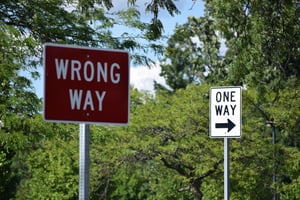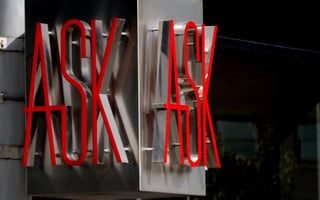So, Matt Hancock has returned to our screens. And this time, the controversial former health...
When will they learn?
Dodging questions in media interviews is never a good look.
The audience hates it. It antagonises journalists. And it does not make the issue go away.
It also leaves spokespeople looking evasive and slippery.
Just ask Rishi Sunak.
His first set-piece interview of 2023 has been undermined by a question about whether he uses private healthcare.
Don't have time to read this blog? You can listen to it here:
It happened during an interview with Laura Kuenssberg on BBC’s Sunday.
Asked if he has been registered with a private GP, the Prime Minister said, “My dad was a doctor. I grew up in an NHS family”, which appeared to be the answer to an entirely different question.
"Why won't you tell us whether or not you use private healthcare?" asks #BBCLauraK
— BBC Politics (@BBCPolitics) January 8, 2023
PM Rishi Sunak says he won't answer questions about his healthcare and it is a "distraction from the things that really matter" https://t.co/iUlJw66iPo pic.twitter.com/KPx1Kr5qPY
When the journalist interrupted that scripted response and asked the question again, he said: “As a general policy, I wouldn’t ever talk about me or my family’s healthcare situation. It is not really relevant. What is relevant is the difference I can make to the country.”
Ms Kuenssberg interrupted him, asking him why he won’t say whether he has private healthcare.
“It is a distraction from what the real issue is,” he said. “The real issue is, are we making sure there is high-quality healthcare available for the country?
“When it comes to the private sector in general, we should be making use of the independent sector. I don’t have any problem with that whatsoever.”
This approach to a pretty straightforward question resulted in more damaging headlines for Mr Sunak.
Ironically, having claimed the question was a “distraction”, it was his answer – or lack of one – that unwittingly became the focus of attention.
And you have to wonder whether a refusal to answer questions like this is a good look for a man who promised to bring “integrity” and “accountability” back to No 10.
So, what media training lessons can we learn from this?
Well, firstly, it is surprising the question seems to have caught the Prime Minister off-guard.
At a time when the NHS is in crisis, a question about whether Mr Sunak benefits from private healthcare should have been anticipated.
And a better approach should have been taken than trying to dodge and evade the question.
So, what should he have said?
Well, that comes down to a simple issue - would anyone really be surprised that a man of enormous wealth has private healthcare?
We know he can easily afford it – his family is estimated to be worth £730 million.
If anything, it would be surprising if he didn’t have private healthcare, so it’s unlikely people would see such an answer as an admission the NHS is falling over.
The public is not stupid. Those watching would know that if the Prime Minister used the NHS, he would be happy to say so.
So, they also realise that when he claims the question is a “distraction” or goes off a tangent about his family, it means he does have private healthcare - he’s just worried about the fallout of admitting it.
Those worries are, presumably, fuelled by the ongoing narrative that he is out of touch and detached from reality.
But people would probably have more respect if he was open, honest and owned the issue.
What’s wrong with saying, “Yes, I do have private healthcare, and I understand that is not an option for lots of people. But it does not detract from my understanding of the challenges the NHS faces or my determination to tackle them.”
Or perhaps he could say: “Yes, I do have private healthcare, and I appreciate it is a luxury that not everyone can afford – which is why I am committed to making the NHS the best free healthcare service it can be.”
Or maybe: “Yes, I do have private healthcare, and I know this is not something that everyone can afford, which is why the NHS is so important and why we are…”
He could then go on to give examples of what he is doing.
There would, of course, still have been a bit of a political hit.
But the headlines would be less damning, and the story would move on more quickly.
Whereas, with this bungled approach, the questions about his use of private healthcare will continue.
And he’ll quite possibly end up admitting what he so desperately tried to avoid saying in this interview.
On our media training courses, we stress the importance of interview preparation. And that involves anticipating the awkward questions that could be asked.
A question about private healthcare use shouldn’t blindside a wealthy Prime Minister.
Apart from anything else, it is an issue that has rumbled on in the background since it was claimed in November that he is registered with a private GP practice in west London.
Answer the question and then use the bridging technique to regain control of the conversation and steer it to safer ground.
And if you face a question you don’t like, don’t rile the reporter by claiming the question is not “relevant”.
It is not a spokesperson’s job to comment on what issues might interest the public, however uncomfortable they might be.
Personal questions are often asked in media interviews, as we stress to our media training delegates.
And they are not just put to our elected representatives.
If you work in finance, you might be asked about pensions, savings and spending. If you work in the NHS, you might face questions about the last time you got a GP appointment. Work in housing? You could be asked whether you would like to live next to a controversial development.
And these types of questions shouldn’t leave your interview on life support.
Media First are media and communications training specialists with over 35 years of experience. We have a team of trainers, each with decades of experience working as journalists, presenters, communications coaches and media trainers.
Click here to find out more about our media training.
Subscribe here to be among the first to receive our blogs.




